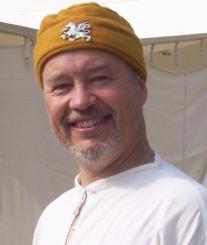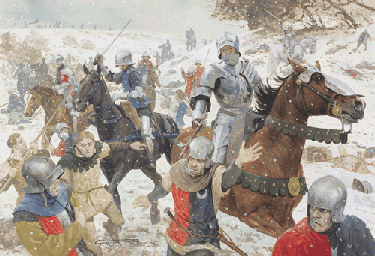
A Worcester! A Worcester! - Blood for the Butcher!
Sir John Howard - "Jockey of Norfolk" |
 |
Sir John Howard, or "Jockey of Norfolk" as he was affectionately know, was born around 1425 and was a prominent figure of the 15th Century. He served in France in 1451 and 1453 and earned a reputation as an excellent soldier.
|
He was actually a retainer of the 3rd Duke of Norfolk, Sir John Mowbray from the early 1450's. In 1461, as John Mowbray was old and ill at the time, John Howard was almost certainly leading the contingent for the Duke of Norfolk that arrived late at the battle of Towton, and turned the tide from a likely Yorkist defeat into a decisive Lancastrian rout. An event which firmly extablished Edward IV's hold on the throne. Howard was made Constable of Norwich Castle the same year. We have used a little historical "re-enactment licence" here and placed Jockey into John Tiptoft's household instead of Mowbray's. This is not altogether unlikely, as the Duke of Norfolk was a neighbouring Yorkist Lord (Tiptoft's estates were largely in Cambridgeshire) and Jockey was of a similar age to John Tiptoft, though not so highly born, and untitled at this time. Thus he would have served in his Lord's colours on the battlefield, even though he had his own coat of arms as a noble in his own right. |
Lancastrians are cut down in their thousands as they flee the field at Towton, the bloodiest battle ever fought on British soil. |
Tiptoft and Howard were both stauch Yorkists for the entire Roses conflict, they certainly met and were present in court together. Of a similar age, Tiptoft and Howard were probably friends as well as dependable allies. There are records of them having shared duties given them by the king. Howard was elected Knight of the Shire for Norfolk in 1455 and Suffolk in 1467.
Oddly, Henry IV created him "Baron Howard" in 1470 on his brief readeption to the throne. This may have been part of a desparate attempt to win over staunch Yorkists as it is notable that only John Tiptoft, of the prominent Yorkist Lords was executed by Henry. It was oviously important to win over as much support as possible to try to strengthen his tenuous grip on the English throne. Howard seems to have kept himself out of harm's way and, regardless of the attempt to buy his loyalty with this title, remained loyal to Edward. He was one of the first to support him and proclaim him king when he returned to take the throne back in 1471. Fighting with him, against the Lancastrians, at the Battle of Tewkesbury.
With John Tiptoft dead, Edward now needed another loyal and trustworthy supporter to take his place. Howard seems to have filled that role to a large extent.
John Howard became incresingly more influential as the century wore on, and he was highly regarded as fine military leader and a skilled diplomat. The French king was especially impressed with him, and he served for some time as French ambassador and eventually received a pension from King Louis XI as a sign of his repect. He remained as a voluntary hostage, in Edward's stead, after negotiating peace after a military campaign in France. On his return he was granted lands confiscated from the Earl of Oxford, John de Vere.
At Edward IV's funeral in April 1483, Jockey carried Edward's Banner. He then attached himself to Richard III. On 13 May 1483, he was appointed High Steward of the Duchy of Lancaster and was made a Privy Councillor. A month later, John Howard was created Duke of Norfolk and Earl Marshall.
At Richard III's coronation, Howard performed many functions - he acted as High Steward, bore the crown, and, as Earl Marshall, was the King's Champion. Shortly afterwards, he was created Admiral of England, Ireland, and Aquitaine, and was appointed Chief of Commissioners to negotiate with James III of Scotland on 12 Sep 1484 at Nottingham.
His career with Richard effectively mimicked that of John Tiptoft and Edward 15 years earlier. In fact it can be argued that Howard took over from where Tiptoft had left off, as the king's most trustworthy lieutenant, an educated man of great influence and unswerving loyalty.
|
Richard III's standard flies at Bosworth Field as it is today. |
In August 1485 John Howard, now a man of around 60 years of age, summoned his retainers and, despite the famous warning pinned to his tent the night before the battle ("Jockey of Norfolk be not too bold, For Dickon thy master is bought and sold") he marched with his king onto the field at Bosworth. In command of Richard's vanguard Howard died, fighting alongside his monarch, the last Plantagenet and true King of England. Defeated by the treachery of the Stanleys and the cowardly inaction of the Earl of Northumberland. King Richard was replaced by the usurping Tudor who was to become Henry VII. The Howard family was attainted and Jockey's son, Thomas Howard, who had fought valiantly alongside his father at Bosworth, was imprisoned. However, the Howard's were not finished............... .....Thomas was destined to become one of the major military leaders of the early Tudor dynasty, destroying the Scots at Flodden Field and regaining his father's estates and title......... |
Contact info
Peter Moore: p1415moore@hotmail.com
John Horgan: john@worcesterhousehold.co.uk
